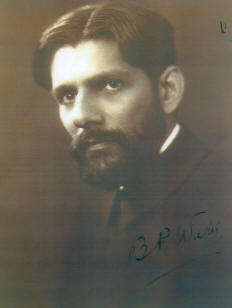
Of Measuring Rods
B. P. WADIA

Of Measuring Rods
B. P. WADIA
© 2005 Online Teosofiska Kompaniet
Malmö

___________________________________________________________________
The blight of mediocrity lies upon our civilization, for all its material triumphs. It is not the ability to go forward that is lacking, but the incentive. Most men make the fatal mistake of setting their aims below their potentialities. Their ideal overtaken, they will slip into the lethargy of indolent content. It is a truism that naught of worth can be acquired without proportionate expenditure of effort. Who puts no effort forth, marks time, perhaps his whole life long, the heights he might conquer unperceived. What sadder sight can meet the eyes than one who might scale Everest resting complacent on a hillock's crest ?
The plants well illustrate the universal truth that growth is a necessary concomitant of life. No year goes by that a living tree does not add to its stature, its possible size conditioned only by the proportion between its length of life and rate of growth. In man, life continues after physical growth attains its maximum, but a man whose growth in other directions ceases is as good as dead. Any ideal in which possible material achievement figures is dangerous for man because it is attainable. The advice of the late James A. Garfield, President of the United States, was: ”Do not, I beseech you, be content to enter upon any business that does not compel constant intellectual growth.”
It is human nature to compare ourselves with those about us and our deeds with theirs. If surrounded chiefly by our inferiors or even by our equals, we are likely to look no farther for a measuring rod and thus to overrate ourselves and our performance. The familiar advice to seek the company of our betters, therefore, is too often attributed to snobbishness, while it is rooted in another and more healthy soil. We shall do well to follow the advice, if by our betters we understand, not those who have more wealth or a higher social position, not even necessarily those who are cleverer than we, but those who are our moral superiors.
It is well to grow steadily in mental powers and grasp, but it is about everything important that moral growth shall go on. How may it be stopped? By the relaxing of effort that inevitably accompanies self-satisfaction.
When a man thinks he is wise enough, his intellectual growth has ended. His ideas crystallize, his opinions assume the rigidity of death. Similarly, when one is satisfied with his moral stature, when complying with the law and the social conventions seems to him to suffice, the growth of his character is checked. Too often, in human character, the good is the enemy of the better. It is a more dangerous, because a more subtle, foe than evil itself. Abuses, if flagrant enough, compel correction, whereas tolerable conditions lull into acceptance of that which is below the ideal.
It resolves itself thus into a question of the measuring rod employed. The ordinarily good man who contrasts his character with that of the criminal and misanthrope, congratulates himself that he is not as other men. If he measures his morals against the general level of morality of those about him, he is almost sure to find some points on which his standards are higher than theirs. It is natural for him to dwell upon these points of superiority, to overlook or ignore the ways in which he falls short of the average, and to conclude that, after all, he is quite a good fellow and doing as well as reasonably can be expected of him. And so he frequently settles down in a rut, which has been defined as a grave with the ends knocked out, and leaves his character to the random shaping of the events of his life. His like fill the sorry ranks of the acquiescent in mediocrity.
Not so the man who measures himself against his standard of perfection. Whether he takes the abstract ideal or seeks to emulate one of the Elder Brothers of the race, he has a living ideal, potent, growing with his growth. He never can be satisfied with his achievements so long as he holds fast to his ideal, and so he never can fall into the living death of smug complacency.
Perfection in an absolute sense is unattainable in an infinite universe, but it is at man's peril that he rests content with anything short of it. Even when the relative perfection possible in any given stage of manifestation is attained, a dim prescience of the waiting heights in other worlds and times must keep the wise man humble.
Let our aim, then, be beyond the probabilities of accomplishment, and our gauge the highest we can conceive, if we will rise from mediocrity to the full stature of man!
B. P. WADIA
Indian Institute of World Culture in Bangalore
October Bulletin 2005_______________________________________________________________________________________________________
| till toppen av sidan | till B P Wadia Online huvudindex | till ULTs hemsida |
Copyright © 1998-2014 Stiftelsen Teosofiska Kompaniet Malmö
Uppdaterad 2014-03-23